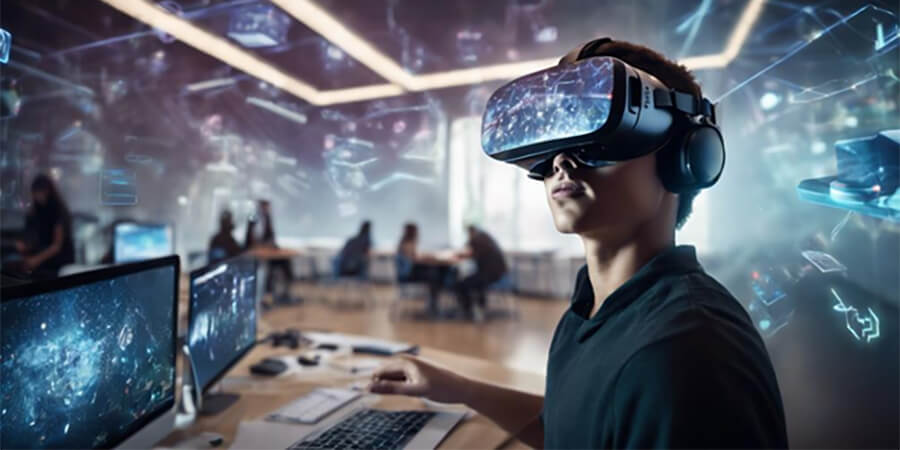The Future of Learning:
Advancements in Digital Education
See also: Learning Styles
Imagine you're a pioneer, exploring uncharted territories in the wild west of education. The landscape has drastically changed with digital advancements, and it's almost unrecognizable from the traditional classrooms you're used to. Artificial intelligence, virtual reality, and personalized learning platforms are propelling us into a new era of learning.
But, what does this mean for you, and how will it shape the future of education? There's more to explore, so let's journey together into this brave new world.

Exploring the Digital Education Landscape
As you navigate through the ever-evolving digital education landscape, understanding its latest trends, the impact of technological advancements, and the potential they hold for transforming learning experiences is crucial. This terrain is rich in innovation, where concepts like flipped classrooms, gamification, and personalized learning are sprouting, gaining traction, and influencing pedagogical approaches.
You've likely heard of the flipped classroom model, where traditional teaching methods are inverted to allow for more interactive, student-centered learning. This trend has been expedited by the advent of digital technologies, enabling students to review lecture materials at their own pace and engage in more active learning during class time.
Similarly, gamification is another trend that's making waves. By integrating game mechanics into the learning process, educators are finding they can enhance student engagement and motivation.
Finally, there's personalized learning. Digital platforms are now able to tailor educational content to the individual needs and learning pace of each student. It's an approach that's proving to be highly effective in enhancing learning outcomes.
As you can see, the digital education landscape is teeming with potential. It's an exciting realm to explore and understand. In this digital age, online public schools exemplify the fusion of technology and education, offering flexible learning opportunities to students across geographical boundaries.

Impact of AI on Learning Processes
Delving into the domain of Artificial Intelligence (AI), you'll discover it is revolutionizing learning processes in numerous, impactful ways. AI isn't just a futuristic concept; it's here, penetrating the educational sectors, enhancing teaching methods, and personalizing learning experiences.
AI's influence isn't confined to classrooms; it's reshaping distance learning, making education accessible to those who can't physically attend school. AI's ability to analyze data helps identify learning patterns, enabling educators to tailor courses to individual student needs.
- AI's adaptive learning platforms provide customized learning paths, improving engagement and retention.
- Intelligent tutoring systems offer one-on-one tutoring, simulating the interaction between students and human tutors.
- AI's predictive analytics can foresee students' performance, enabling early interventions to boost success rates.
- Automated administrative tasks reduce teachers' workload, allowing them to focus more on instruction.
As AI continues to evolve, so will its impact on learning processes. Embrace its potential while acknowledging the challenges. AI won't replace teachers but will empower them to deliver a more personalized, efficient, and inclusive learning experience. The future of education, it seems, is already here.
Virtual Reality's Role in Education
Diving headfirst into the domain of virtual reality (VR), you'll find it's not just about immersive gaming - it's rapidly transforming the education landscape, driving a paradigm shift in how we teach and learn. VR's capacity to create engaging, interactive 3D environments can enhance both teaching methods and learners' experiences, paving the way for a more holistic, immersive education.
Imagine dissecting a virtual frog in a biology class or exploring the pyramids of Egypt in history. By immersing students in the subject matter, VR stimulates their curiosity, encourages active participation, and fosters better retention. This technology is also breaking down geographical barriers, enabling students to take virtual field trips or experience different cultures firsthand, without leaving their classroom.
However, with great potential comes challenges. The cost of VR equipment and the need for robust infrastructure could limit its accessibility. There's also the risk of over-reliance on technology, which could compromise traditional learning methods. Nevertheless, as VR technology evolves and becomes more affordable, it's poised to play an increasingly significant role in education's future. Let's embrace it, yet with a mindful approach.
Personalized Learning Platforms: A Revolution
Shifting gears to another groundbreaking development in digital education, personalized learning platforms are leading a revolution in how knowledge is delivered and processed. Instead of a one-size-fits-all curriculum, these platforms provide tailored, interactive content targeting your unique learning style and pace. They're not just changing the game; they're rewriting the rules.
Consider the following benefits:
Adaptability: The platform adjusts to your understanding, reinforcing areas where you struggle.
Efficiency: You can learn at your pace, without feeling rushed or held back.
Engagement: Interactive content makes learning fun, increasing retention.
Accessibility: Anyone, regardless of location or resources, can access quality education.
Yet, challenges remain. There's the question of data privacy. What happens to the information collected about you? And how about the digital divide? While you might enjoy the benefits, what about those without internet access?
These are important issues to tackle, but they don't negate the potential of personalized learning platforms. They're revolutionizing education, making it more accessible and engaging than ever before. You're living in exciting times, witnessing a revolution in learning. Brace for impact.

Future Trends in Digital Education
Peering into the future, it's clear that digital education is poised to continue its transformative journey, with several exciting trends on the horizon that you'll want to watch.
To begin with, you can expect a rise in artificial intelligence (AI) in education. AI won't just automate administrative tasks but also assist in personalizing learning, predicting student performance, and even augmenting teacher capabilities.
Next, immersive technology such as virtual reality (VR), augmented reality (AR), and mixed reality (MR) will take center stage. These technologies will create immersive, interactive learning experiences that increase student engagement and understanding.
Additionally, gamification is set to become a standard in digital education. It's a powerful tool that makes learning more interactive and enjoyable, boosting student motivation and participation.
To end with, the trend of learning analytics will become more prevalent. This involves the measurement and analysis of data about learners for the purpose of understanding and optimizing learning.
About the Author
Mashum Mollah loves sharing his experiences, knowledge, and ideas by publishing informative, data-driven articles in various media.
